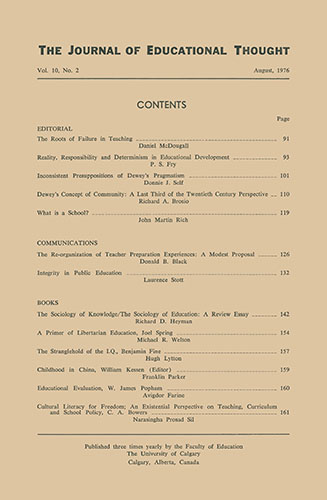Inconsistent Presuppositions of Dewey's Pragmatism
DOI :
https://doi.org/10.55016/ojs/jet.v10i2.43649Résumé
This article exposes a fundamental inconsistency between the philosophical presuppositions of certain pragmatist contentions through a critical analysis of the phrase 'good for what'. It notes that in replacing intrinsic value with instrumental value Dewey reduces value concepts to functional concepts. It establishes that functional concepts presuppose an object value structure and that knowledge of it comes through a wider range of experience than just sensory experience; but this is inconsistent with the pragmatist claim to be a strict scientific naturalism which presupposes that there is no objective value structure and that all knowledge comes through sensory experience. Similar results are obtained from the explication of valuation in terms of troubled experience.
Téléchargements
Publié
Numéro
Rubrique
Licence
The Journal of Educational Thought retains first publication rights for all articles. The Journal grants reproduction rights for noncommercial educational purposes with the provision that full acknowledgement of the work’s source be noted on each copy. The Journal will redirect to the appropriate authors any inquiries for further commercial publication of individual articles. All authors wishing to publish in JET will be asked to fill in and sign a Consent to Publish and Transfer of Copyright agreement.
Authors must affirm that any submission to JET has not been and will not be published or submitted elsewhere while under considration by JET.

